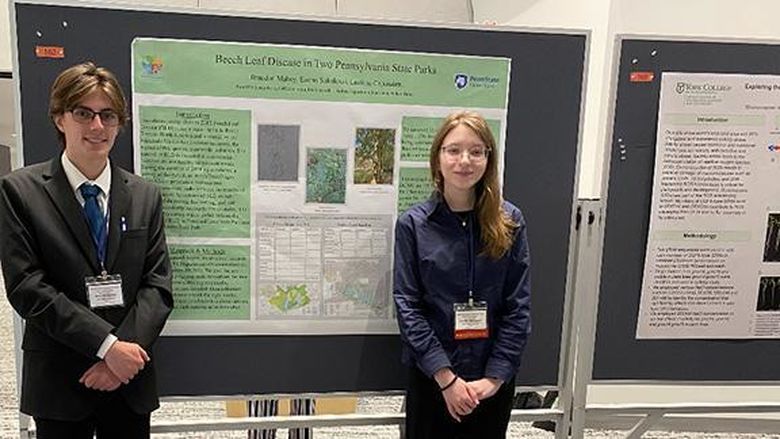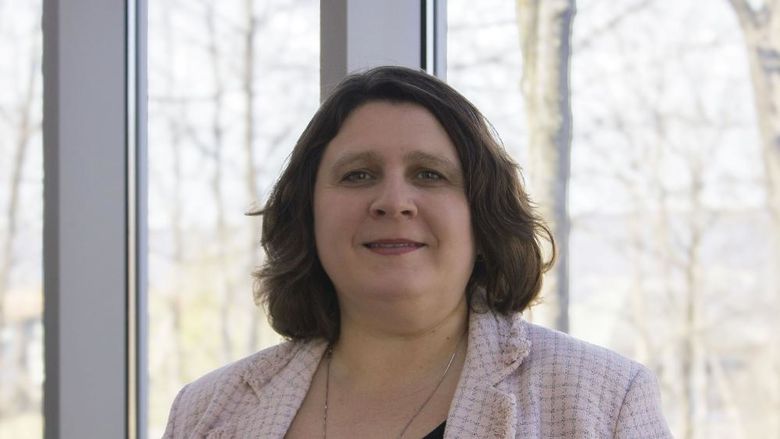
Theresa Baker, left, and Allison Tomczyk both recently attained their doctor of nursing practice (DNP) degrees and have been promoted to assistant teaching professor of nursing.
Two of Penn State Scranton’s nursing faculty, Theresa Baker and Allison Tomczyk, have each recently obtained their doctor of nursing practice (DNP) degree and now also hold the title of assistant teaching professor of nursing.
Baker graduated from Penn State in 1981 with a bachelor of science in nursing and has been working in local hospitals for 32 years, performing tasks such as medical-surgical nursing and staff development, and holding roles like patient and community education nurse manager and pediatrics nurse manager. In addition to her teaching duties at Penn State Scranton, she is a volunteer for Hometown Health NEPA’s COVID-19 vaccination clinics, where she is an RN vaccinator and a supervisor for Penn State student nurse volunteer vaccinators.
Tomczyk has been a registered nurse for 20 years with a specialty in labor and delivery throughout her whole career. In addition to teaching nursing at Penn State Scranton, she is a staff nurse at Geisinger Wyoming Valley Medical Center in Wilkes-Barre, Pennsylvania, in the obstetrics wing. At Geisinger, she is also certified to teach the Association of Women's Health, Obstetric and Neonatal Nurses (AWHONN) Fetal Monitoring Intermediate course to her fellow staff members.
Baker teaches multiple courses at Penn State Scranton, such as Fundamentals of Nursing, Health Assessment, and Introduction to Pharmacology. She also instructs Nursing Care of Children and Adolescents and Nursing Care of Adults with Complex Health Problems as both a lecturer and a clinical instructor.
Tomczyk teaches a variety of courses, including Physical Assessment Lab, Systems and Community Responses, Nursing Care of the Childbearing Family and Gynecological Client, National Council Licensure Examination (NCLEX) Prep, and Historical Perspectives on Healthcare Innovations, which is co-taught with a history professor.
Baker completed her DNP in systems-level leadership at Thomas Edison State University, which she started in 2019. She stated that getting her doctoral degree will allow her to have an impact on the next generation of nursing professionals.
“It means I will continue to educate the next generation of nurses and encourage them to pursue life-long learning opportunities through formal education or professional development opportunities.” Baker said.
Tomczyk obtained her DNP in healthcare system leadership from Chamberlain College of Nursing, which she started in 2017. Similarly to Baker, when asked what obtaining her doctoral degree means for her career going forward, Tomczyk said that it will give her more opportunities to lead and educate the next generation of nurses.
“Obtaining my terminal degree provides me the opportunity to continue teaching at Penn State Scranton and prepared me for leadership positions in the future. It also provides me with the educational background to provide high-quality education to the nurses of the future,” Tomczyk said.
When asked how her experience at Penn State Scranton has helped her in obtaining her doctorate, Baker lauded her fellow nursing faculty as great motivators throughout her educational experience.
“The nursing faculty at PSU Scranton has either competed a PhD or DNP or are currently pursuing a doctoral degree,” Baker said. “This created excellent faculty mentors who provided much needed encouragement throughout my doctoral journey.”
Tomczyk said that she has enjoyed her time teaching at Penn State Scranton and said that “all of the faculty and staff I work alongside have been a major support system while I was actively pursuing my terminal degree.”





